*IN MEMORIAM*
Ed Ellington passed away March 24, 2020 at the age of 100. Click here for his obituary from legacy.com.
Use controls above or click here to open this Hometown Heroes podcast in a new window
95-year-old Ed “Duke” Ellington of Seattle, WA appears on episode #372 of Hometown Heroes, debuting June 20, 2015. A native of South Dakota, Ellington survived 180 missions as a fighter pilot during World War II, and is the recipient of the Silver Star and Distinguished Flying Cross.
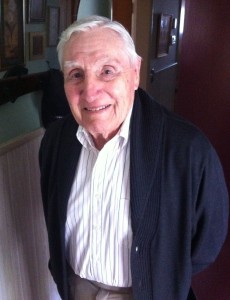
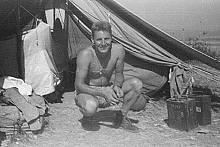
The oldest of seven children growing up in rural South Dakota, Ellington started working for the Civilian Conservation Corps at age 14, helping to support the family during the Great Depression. After high school in Spearfish, SD, he was recruited to play football at what is now Black Hills State University, where he helped produce a conference championship in 1940. During the summer of 1940, Spearfish became a new location for the Civilian Pilot Training program, and Ed began taking flying lessons from a young lady named Evelyn Sharp. By early 1941, he was a licensed pilot and had decided to join the U.S. Army Air Corps. Foster Field in Texas is where he was when the Japanese attacked Pearl Harbor. Five days later, he earned his wings. Originally assigned to the 56th Pursuit Group, Ellington spent the first six months of 1942 flying a variety of airplanes, including the P-36, P-38, P-39, P-40, and P-47 at bases all over the U.S.
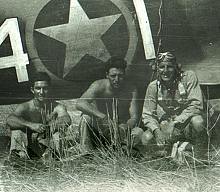
Ellington preferred the idea of flying fighter planes as opposed to bombers. “The excitement was you in your own airplane, doing the war,” Ed remembers. “Instead of being with a crew.” In June, 1942, he was assigned to the 57th Fighter Group, and soon headed across the Atlantic Ocean on the aircraft carrier USS Ranger. You’ll hear him remember 4th of July fireworks that he would have preferred to avoid when German U-boats attacked their convoy, and reflect on propagandist Axis Sally announcing erroneously on the radio that the Ranger had been sunk. 72 P-40s had been crammed onto the carrier, and eventually these Army Air Corps pilots would take off the abbreviated runway the Navy ship provided. “You went down until you were pretty close to the water,” you’ll hear Ellington recall. They would land 100 miles away in Accra in what is now Ghana. Watch the video below for footage of some of those takeoffs on July 19, 1942.
Flying across Africa, and then north into Palestine for training, he eventually made it to a new base in the west African desert, where he would fly escort for American B-25s and British A-20s. These early missions brought Ellington his first encounters with German ME-109s.
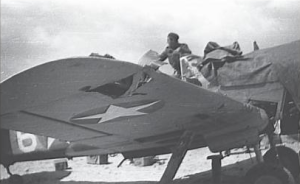
Listen to Hometown Heroes to hear about some of his encounters with the German fighter planes, and why anti-aircraft fire was a more frequent nemesis. While divebombing and strafing enemy forces along Erwin Rommel’s Mareth Line in March 1943, Ellington’s P-40 took a direct hit. “A 20-millimeter shell hit me right in the wing,” the pilot remembers. “It put a hole in it I could put my head through, and it didn’t fly so good after that.” He was able to fly out to sea and then up the coastline to friendly territory, bringing the damaged plane down at a British airfield. You’ll hear what the British crew chief said to him, and why Ed’s squadron mates were especially surprised when he flew back to base. To read more of Ed’s memories of his World War II service, follow this link from the 57th Fighter Group’s outstanding website. Among the other anecdotes you’ll hear in this interview are how being born with one leg longer than the other had an effect on his ability to shoot down enemy planes, why he missed out on the excitement of the “Palm Sunday Massacre” on April 18, 1943.
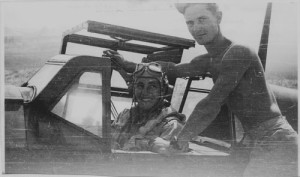
After battling so many ME-109s in the sky, Ed had a burning desire to fly one of the enemy planes, and when the capture of Sicily left six German fighter planes intact, he got his wish. Listen to Hometown Heroes to hear him describe what that experience was like, and how the reception he received from British anti-aircraft units almost made him regret his decision to fly that enemy bird. After 116 missions in P-40s in the Mediterranean, Ed rotated back home to the states to get more familiarity with P-47s and train Thunderbolt pilots who would be heading overseas. You’ll hear why he wasn’t satisfied with that duty, and how he went back overseas in 1944, flying P-47s in combat and eventually becoming the commanding officer of the 65th Fighter Squadron in Italy.
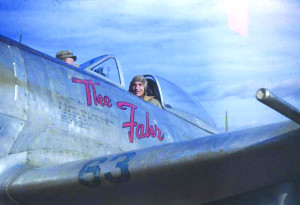
That’s where he flew the remainder of his 180 World War II missions, and he was actually on his way to fly in the Pacific Theater when Japan surrendered, but the biggest reason he’s thankful he “bullied” his way back into his squadron is that it allowed him to meet his wife, Dottie. Nothing about their romance was predictable, from the way Ed got to know the nurse, to the date that nearly turned tragic, to the unlikely venue for his proposal that led to a wedding in less than a week. Hear those stories on Hometown Heroes from a prolific pilot who retired from the Air Force with the rank of colonel in 1968, and if you ever have the privilege of meeting him, please thank “Duke” Ellington for serving our country. Thanks to Ed’s niece, Patty Hixson, for letting me know about her uncle’s remarkable story. Patty runs the Cumulus cluster of radio stations in Fresno, including KMJ, the station that launched Hometown Heroes in 2007 and continues to air the show every Saturday at 6 p.m.
—Paul Loeffler

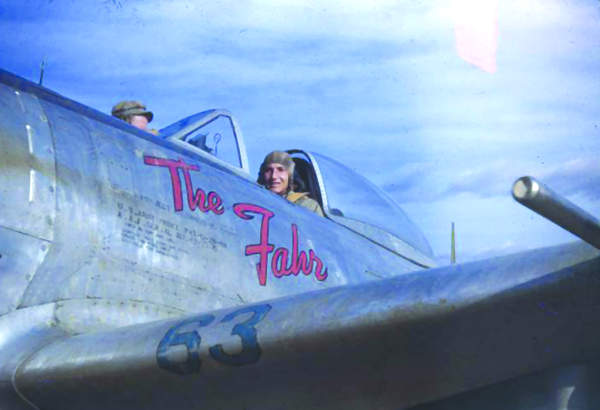
Leave a Reply